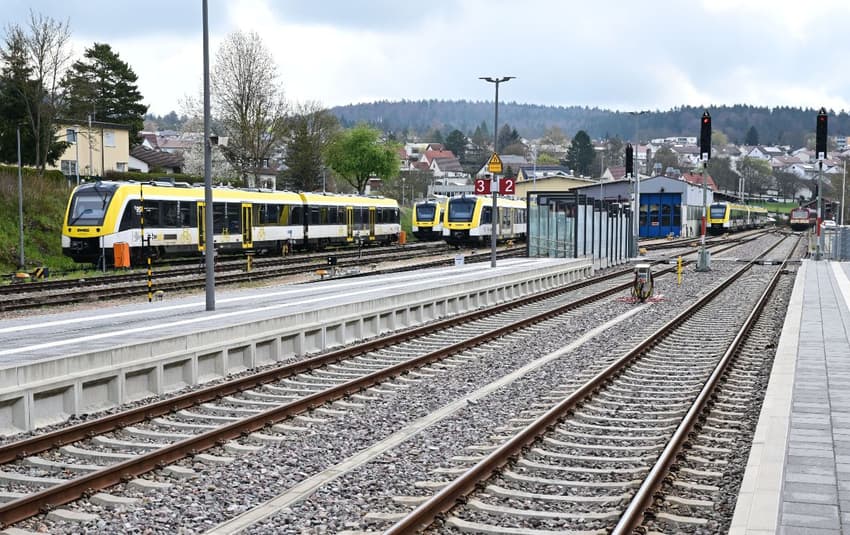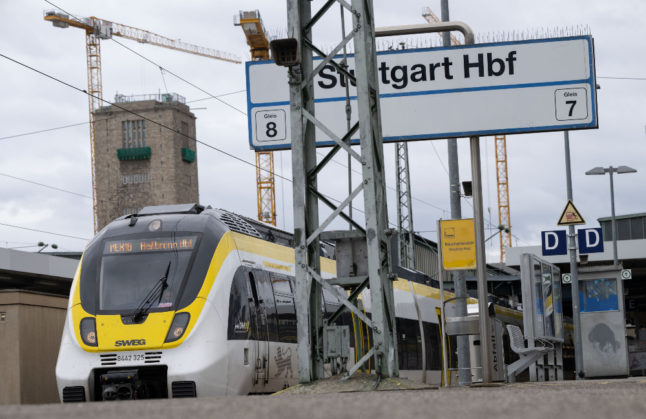New strikes to paralyse transport in several German states on Thursday

Commuters in Baden-Württemberg, Bavaria and North Rhine-Westphalia - among other German states - can expect delays in public transport on Thursday amid a new round of strikes.
Amid fierce negotiations for higher pay, the service sector union Verdi has called another rail strike in multiple German states on May 4th, signalling yet more headaches for commuters.
Public transport workers in the northern states of Schleswig-Holstein and Lower Saxony will be joining workers in North Rhine-Westphalia, Bavaria and Baden-Württemberg in a day of action on Thursday that's likely to cause significant disruption in regional transport.
However, the southwestern state of Baden-Württemberg is likely to be the worst affected.
READ ALSO: More public transport disruption as workers around Germany strike
Here, Verdi has called on the approximately 1,800 employees of Südwestdeutsche Landesverkehrs GmbH (SWEG), which operates bus and rail lines throughout the southwestern state, to walk off from the job on Thursday ahead of the next negotiation round for better pay.
The all-day strike marks the second week in a row that SWEG workers have walked off the job. Last week, in a similar round of strikes, they were also joined by public transport employees in the states of Schleswig-Holstein, Lower Saxony, North Rhine-Westphalia, and Bavaria.
Why are there more transport strikes?
The strike comes ahead of the next nationwide collective bargaining round on Friday, and is intended to put pressure on Germany’s public transport employers.
"The strikes send a clear message: the more prices continue to rise, the more the willingness to strike increases", said Verdi negotiator Volker Nüsse in a statement last week.
Verdi wants to put pressure on the negotiations for the collective pay agreement on railways (ETV), which applies to about 40 transport companies with about 5,000 employees.
They are not covered by the collective agreement for the federal and municipal public service, for which an agreement was reached in April for a 5.5 percent annual pay hike - potentially ending months of public sector strikes.
READ ALSO: German public sector workers clinch 5.5 percent pay rise

A SWEG train pictured at Stuttgart's main train station in January. Photo: picture alliance/dpa | Marijan Murat
The Verdi negotiations also have nothing to do with the current collective bargaining at Deutsche Bahn and other railway companies, which is currently being conducted by the train and transport union EVG.
On Friday, EVG threatened weeks’ long strikes throughout all of Germany after their demands were not met.
Verdi is asking for €550 per month for a period of twelve months for its workers, and for trainees' pay to increase to €250 .
So far, employers have offered a tax-free special payment of €1,080 and twelve monthly one-off payments of €160.
Vocabulary
disturbances/disruptions - (die) Störungen
Call on - aufrufen
Negotiations - (die) Verhandlungen
trainees’ pay - (die) Auszubildendenvergütung
We’re aiming to help our readers improve their German by translating vocabulary from some of our news stories. Did you find this article useful? Let us know.
Comments
See Also
Amid fierce negotiations for higher pay, the service sector union Verdi has called another rail strike in multiple German states on May 4th, signalling yet more headaches for commuters.
Public transport workers in the northern states of Schleswig-Holstein and Lower Saxony will be joining workers in North Rhine-Westphalia, Bavaria and Baden-Württemberg in a day of action on Thursday that's likely to cause significant disruption in regional transport.
However, the southwestern state of Baden-Württemberg is likely to be the worst affected.
READ ALSO: More public transport disruption as workers around Germany strike
Here, Verdi has called on the approximately 1,800 employees of Südwestdeutsche Landesverkehrs GmbH (SWEG), which operates bus and rail lines throughout the southwestern state, to walk off from the job on Thursday ahead of the next negotiation round for better pay.
The all-day strike marks the second week in a row that SWEG workers have walked off the job. Last week, in a similar round of strikes, they were also joined by public transport employees in the states of Schleswig-Holstein, Lower Saxony, North Rhine-Westphalia, and Bavaria.
Why are there more transport strikes?
The strike comes ahead of the next nationwide collective bargaining round on Friday, and is intended to put pressure on Germany’s public transport employers.
"The strikes send a clear message: the more prices continue to rise, the more the willingness to strike increases", said Verdi negotiator Volker Nüsse in a statement last week.
Verdi wants to put pressure on the negotiations for the collective pay agreement on railways (ETV), which applies to about 40 transport companies with about 5,000 employees.
They are not covered by the collective agreement for the federal and municipal public service, for which an agreement was reached in April for a 5.5 percent annual pay hike - potentially ending months of public sector strikes.
READ ALSO: German public sector workers clinch 5.5 percent pay rise

The Verdi negotiations also have nothing to do with the current collective bargaining at Deutsche Bahn and other railway companies, which is currently being conducted by the train and transport union EVG.
On Friday, EVG threatened weeks’ long strikes throughout all of Germany after their demands were not met.
Verdi is asking for €550 per month for a period of twelve months for its workers, and for trainees' pay to increase to €250 .
So far, employers have offered a tax-free special payment of €1,080 and twelve monthly one-off payments of €160.
Vocabulary
disturbances/disruptions - (die) Störungen
Call on - aufrufen
Negotiations - (die) Verhandlungen
trainees’ pay - (die) Auszubildendenvergütung
We’re aiming to help our readers improve their German by translating vocabulary from some of our news stories. Did you find this article useful? Let us know.
Join the conversation in our comments section below. Share your own views and experience and if you have a question or suggestion for our journalists then email us at [email protected].
Please keep comments civil, constructive and on topic – and make sure to read our terms of use before getting involved.
Please log in here to leave a comment.